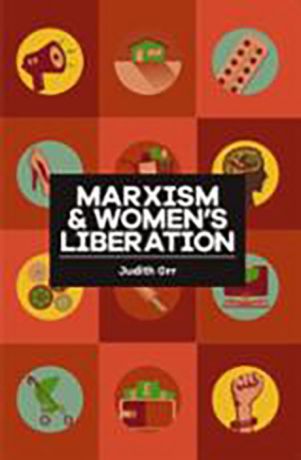Arts
You are here
Marxism and women's liberation

October 7, 2015
This book is a must read for feminists and socialists, and really for anyone who wants to understand—and more importantly, fight to end—women’s oppression. It is a masterful overview of the gains made by successive waves of the women’s movement and also how those gains cannot be taken for granted as the system goes into crisis and triggers a backlash.
There could be no more timely reminder than the recent decision to defund Planned Parenthood in the US: the spectacle of the world’s wealthiest capitalist country effectively denying access to basic reproductive health care to working class and poor women (and men) in the 21st century.
In this context, one of the quotes Orr includes from Russian revolutionary Lenin could scarcely be more appropriate. Lenin is referring to the gains women made in Russia within one year of the Bolshevik revolution of 1917, which overturned centuries of tsarist oppression and appalling conditions for working class and peasant women: “Take the position of women. In this field, not a single democratic party in the world, not even in the most advanced bourgeois republic, has done in decades so much as a hundredth part of what we did in our very first year in power…We really razed to the ground the infamous laws placing women in a position of inequality, restricting divorce and surrounding it with disgusting formalities, denying recognition to children born out of wedlock, enforcing a search for their fathers, etc, numerous laws survival of which, to the shame of the bourgeoisie and of capitalism, are to be found in all civilized countries.”
Orr’s book reminds us of the many heroic struggles, past and present, women have been involved in for our own liberation: the struggle for the vote, the continuing struggle for access to free and legal abortion and reproductive justice, the fight for sexual liberation and against the rigid gender roles imposed on women (and men) inside the family, struggles in the workplace against sexism, lower wages and the ghettoization of women’s labour.
Class society, the family and oppression
At the same time she reasserts the importance of Marxism as a theory which is critical both to understanding the roots of women’s oppression and to organizing ourselves to end it. Orr’s book grounds an understanding of the origins of women’s oppression in the role of the family and the way emerging class society shaped it. She looks to the work of Marx and Engels, particularly Engels’ book The Origin of the Family, Private Property and the State, to refute the notion prevalent in much patriarchy theory that all women are oppressed by all men throughout human history, and that this division is fundamental to human nature.
Orr asserts that Engels’ book, although some of it was based on incorrect information (the anthropological evidence that was available when he was writing), is still important today because it demonstrates that women’s oppression is not biologically based, and therefore not eternal. Engels points to the way human society was organized in pre-class societies that did not enforce strict gender roles or live in the “natural” nuclear family structure that we know today. Subsequent Marxist-feminist anthropologists, such as Eleanor Burke Leacock and Karen Sacks, have agreed with much that Engels wrote in his ground-breaking work.
In a very interesting section on gender in her book, Orr exposes some of the weaknesses of patriarchy theory when it comes to understanding LGBT liberation. In many pre-class and pre-capitalist societies there is evidence of a much less strictly enforced notion of gender—rather than the rigid binary of “male” and “female.” She gives the example of two-spirited people in Indigenous societies. With the institutionalization of the nuclear family and rigid gender roles in the 19th century, women and men were expected to conform to gender norms. This is one of the reasons LGBT people come under such attack since they challenge these norms. This is particularly true for trans people. And unfortunately it hasn’t only been the religious right attacking their rights. Orr talks about trans women being excluded from women-only events because they are not “real” women: “This rejection of trans women because they are not ‘born as women’ flows from the weakness of a theory of women’s oppression rooted in patriarchy theory.”
Struggle
Orr’s argument is not that the family hasn’t changed over the last 200 years, but that the oppressive nature of the family cannot simply be wished away since it is shaped and influenced by the economic system we all live under. Capitalism needs the nuclear family as the cheapest way to bring up the next generation of workers, at little expense to the capitalist class—especially in today’s recessionary times. This in turn, increases the level of pressure on individual members of the family—and particularly on women—to try and meet all the shortfalls of a system in crisis (crumbling social services, healthcare and elder care, lack of affordable day care, etc.).
Marxism and Women’s Liberation is also an argument against separating the phenomenon of women’s oppression from the economic system which structures and reinforces that oppression. It’s impossible to understand women’s oppression without understanding how integral it is to capitalism, and the most effective way of fighting women’s oppression is actually to wage the fight where we are strongest: in the workplace where people of all genders are brought together and have to cooperate together in order to win.
Thus some of the most important gains women have made here in Canada have been won by united working class action—such as the introduction of paid maternity leave, which was fought for and won by the Canadian Union of Postal Workers. CUPW also won the right for public sector workers to organize, and the strength of many public sector unions today depends on their women members. Likewise the struggle for access to free abortion was fought and won in Canada with a united struggle of women and men, often with the support of trade unions. In Quebec the first (illegal) abortion clinic was set up in the offices of the CSN (one of Quebec’s biggest trade union federations).
Revolution
But if we don’t want to find ourselves fighting the same battles over and over, Orr argues, we need fundamental system change. We need to overthrow the current system so that we can have the freedom to choose the kinds of families we want to live in, free from economic pressure. We need a system based on the needs of the many, not the profits of the few, and where society can put resources into things that matter to the vast majority: safe housing, health care, protection of the environment, etc.
That is why Orr dedicates her book to Revolutionary Socialist and human rights lawyer Mahienour el-Massry, who has been persecuted and imprisoned by the reactionary military regime in Egypt for her part in the Arab Spring of 2011. The revolution, in which Mahienour and millions of other Egyptian women and men participated, ended the 30 year reign of Western-backed dictator Hosni Mubarak.
In the heady days of the revolution, when ordinary Egyptians took over Tahir Square in central Cairo, we saw a glimpse of the power of revolution to change people’s behavior and attitudes. Women reported never feeling unsafe or being harassed in the square, when in general, sexual harassment had been a serious problem in Egyptian society. Women provided security for those inside the square, along with men. This shows the power of revolution, when ordinary people take the running of society into their own hands. This is why Lenin referred to revolution as a “festival of the oppressed.”
In the end, Orr’s argument is not one about waiting for a revolutionary movement: “If the bigots who want to push back abortion rights get away with it, then thousands of women will be forced to overcome more obstacles to access an abortion. So every protest and demonstration makes a difference, every activist who raises a motion in trade union or student meetings to win support for Abortion Rights makes a difference. Whether we campaign to defend nurseries or women’s refuges from the cuts, or strike for equal pay or pension rights, or fight to stop sexist advertising, what we do now can not only win improvements today, it will shape the struggles of tomorrow.”
Her book is a powerful argument for the necessity of socialist revolution, if we are not to continually refight battles we thought we had won for good.
Order online from Bookmarks bookshop
Section:










